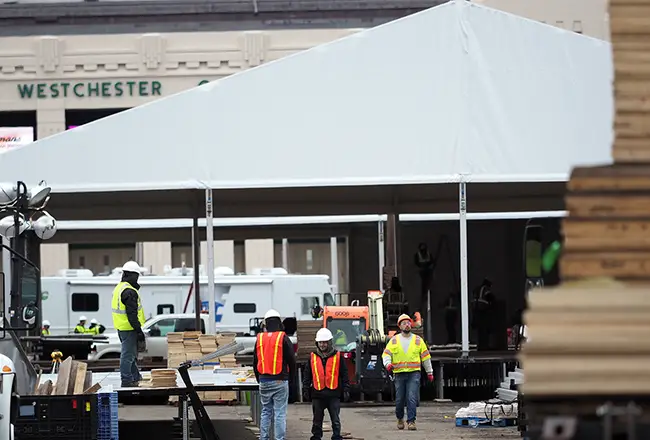Connecticut has been informed that the strategic national stockpile of pharmaceuticals and medical supplies “is empty,” Gov. Ned Lamont said at his daily briefing today.

While the state received an additional 50 ventilators today, “For now we are on our own,” he said. “We are scouring the globe for PPE (personal protective equipment) as best we can. As your governor, this breaks my heart.”
The state”™s COO Josh Geballe said that another 557 residents have tested positive for COVID-19, bringing the total to 3,128 out of about 15,600 tests. One of those testing positive was Bristol Hospital President Kurt Barwis, who is self-quarantining at his Bristol home.
The state has recorded a total of 69 deaths ”“ 16 more over the last 24 hours, and 17 that had not been recorded over the last two weeks.
About 400 of the infected are in Fairfield County, with 145 in New Haven County. There are now 608 hospitalizations around the state.
A county-by-county breakdown includes:
| County | Laboratory Confirmed Cases | Hospitalized Cases | Deaths |
| Fairfield County | 1,870 | 275 | 38 |
| Hartford County | 393 | 110 | 7 |
| Litchfield County | 121 | 7 | 1 |
| Middlesex County | 56 | 5 | 1 |
| New Haven County | 517 | 202 | 12 |
| New London County | 27 | 8 | 1 |
| Tolland County | 56 | 1 | 7 |
| Windham County | 11 | 0 | 0 |
| Pending address validation | 77 | 0 | 2 |
| Total | 3,128 | 608 | 69 |
Asked if he agreed with New York Gov. Andrew Cuomo”™s estimate today that the virus”™ peak would take place over the next 7-21 days, Lamont said, “We”™re pretty certain this is going to keep going for at least another two to three weeks.”
Lamont said that Connecticut has the fourth-highest number of infections, behind New York, New Jersey and Louisiana. He again implored the federal government to think about the virus infection rate on a regional, not state-by-state, basis.
Looking forward, the governor said he believes that April will be “a horrible month,” echoing remarks he made during a radio interview earlier today with WPLR-FM.
Warning that Fairfield County hospitals are “getting close” to reaching their maximum capacity, the governor told WPLR that additional restrictions are probably coming.
“Probably we have to take a look at what is an essential worker and to continue to tighten that up in terms of any possible confusion,” he said, adding that despite repeated pleas, young people in particular continue to gather to play basketball and engage in other group activities. “We’ve got to be a lot stricter in some of these places where people tend to congregate,” he said.
In the meantime, a 250-bed mobile hospital from FEMA was being built today inside the Moore Fieldhouse on the Southern Connecticut State University campus, while the National Guard is scheduled to start building a third mobile hospital, a 25-bed unit at Middlesex Memorial Hospital. The others, built last week, are at St. Francis Hospital and Danbury Hospital.
 The state is also retrofitting at least one Western Connecticut State University dorm in Danbury to include 200 to 250 beds for Danbury Hospital overflow, while the U.S. Army Corps of Engineers is considering the Connecticut Convention Center and the Mohegan Sun casino as additional potential overflow sites.
The state is also retrofitting at least one Western Connecticut State University dorm in Danbury to include 200 to 250 beds for Danbury Hospital overflow, while the U.S. Army Corps of Engineers is considering the Connecticut Convention Center and the Mohegan Sun casino as additional potential overflow sites.
BANKING RELIEF
At today’s briefing, Lamont announced an agreement with 65 credit unions and banks in Connecticut to offer mortgage relief to the state”™s residents and businesses who continue to face hardship caused by the global COVID-19 pandemic.
Under the agreement, the following relief policies are being offered by participating financial institutions:
- 90-day grace period for all mortgage payments: Participating financial institutions are now offering mortgage-payment forbearances of up to 90 days, which will allow homeowners to reduce or delay monthly mortgage payments. In addition, the institutions will:
- Provide a streamlined process for requesting forbearance for COVID-19-related reasons, supported with available documentation;
- Confirm approval and terms of forbearance program; and
- Provide the opportunity to extend forbearance agreements if faced with continued hardship resulting from COVID-19.
- Relief from fees and charges for 90 days: For at least 90 days, participating financial institutions will waive or refund mortgage-related late fees and other fees including early CD withdrawals.
- No new foreclosures for 60 days: Financial institutions will not start any foreclosure sales or evictions.
- No credit score changes for accessing relief: For those taking advantage of this COVID-19-related relief, late or missed payments will not be shared with credit reporting agencies.
The agreement, which was negotiated on behalf of the Lamont administration by Commissioner Jorge Perez at the Connecticut Department of Banking, builds upon similar initiatives that have been enacted in recent days in California and New Jersey, and has been endorsed by the Connecticut Bankers Association and the Credit Union League of Connecticut.
Institutions participating statewide include Webster Bank, American Eagle Financial Credit Union, Liberty Bank, Charter Oak Federal Credit Union, Bank of America, Nutmeg State Financial Credit Union, and Peoples United Bank.
Credit Union League President and CEO Bruce Adams said that 40 credit unions representing 650,000 customers ”“ about 2/3 of the state”™s total ”“ had joined the initiative, and Bankers Association President and CEO Tom Mongellow said of the state”™s 52 banks, 25 had joined; both said they expect additional institutions to join soon. The Department of Banking will maintain updated list of participating institutions on its website.
“In some ways, we feel like we”™ve been preparing for this our whole lives,” Adams said of the collaborative effort.
Perez asked that consumers wait a couple of days for the banks”™ call centers to be fully prepared before inquiring about the new arrangements.
FEDERAL AID FOR VOTING SECURITY
Meanwhile, Secretary of the State Denise Merrill and Connecticut’s congressional delegation announced the pending arrival of nearly $5.4 million in voting safety and security funding from the federal government.
Connecticut will receive the funding from the Coronavirus Aid, Relief, and Economic Security (CARES) Act.
“No one should have to choose between protecting their health and casting a ballot,” Merrill said. “This funding is a good start in providing what we need to run our 2020 elections in the face of the coronavirus.
“With the proposed loosening of restrictions on absentee ballots,” she continued, “this funding would be able to pay for an expansion of voting by mail in every town, securing the health and safety of poll workers and voters alike in our polling places, and enhance the security of balloting by providing the resources necessary for our towns to collect, store, and count ballots securely.”
Merrill asked Gov. Ned Lamont to use his emergency powers to issue an executive order removing restricting language from the absentee ballot statute so that people can vote by mail if they want to avoid a polling place due to the coronavirus emergency. An earlier request to allow the same for Connecticut’s primary was not granted.
‘GLIMMERS’ OF HOPE
Dr. Anthony Fauci, director of the National Institute of Allergy and Infectious Diseases, told CNN today that social distancing measures appear to be working ”“ “We”™re starting to see glimmers that that is actually having some dampening effect,” he said ”“ but warned that the U.S. has yet to see a slowdown in the number of cases.
“What we’re starting to see right now is just the inklings,” Fauci said. “And I don’t want to put too much stock on it, because you don’t want to get overconfident, you just want to keep pushing in what you’re doing. You’re starting to see that the daily increases are not in that steep incline, they’re starting to be able to possibly flatten out.”
The White House is expected to formally release revised national coronavirus guidelines tonight, following its extension yesterday of social distancing guidelines for another 30 days, until at least April 30.
President Donald Trump tweeted today that the U.S. should spend another $2 trillion on a gigantic infrastructure package, four days after he signed the $2 trillion CARES relief bill.
“It should be VERY BIG & BOLD, Two Trillion Dollars, and be focused solely on jobs and rebuilding the once great infrastructure of our Country! Phase 4,” Trump tweeted, referring to the three pieces of emergency legislation Congress has passed to battle the pandemic.



















